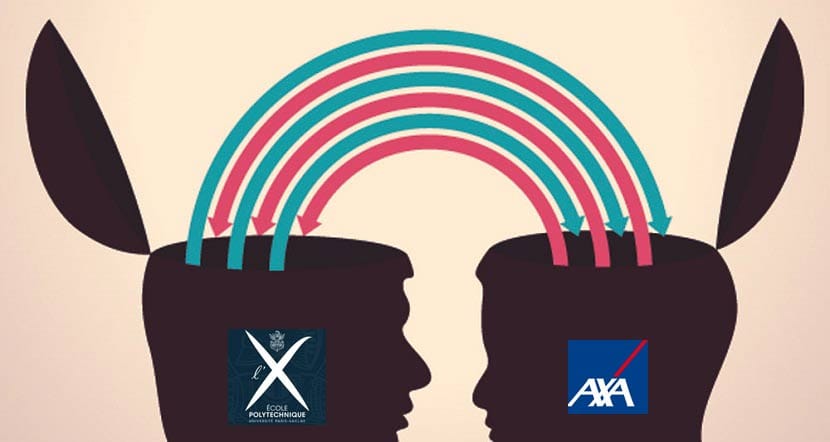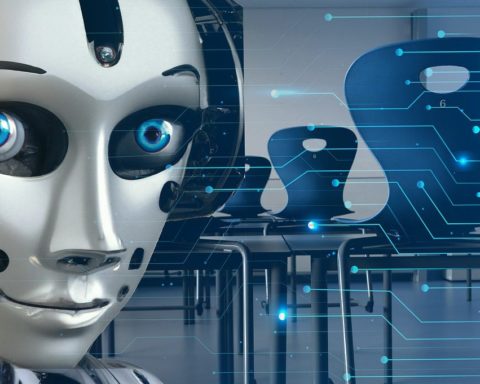"What use is dTP3T39; to imagine an education that would be deadly for the society that would put it into practice? »
Émile Durkheim, Education and Sociology, 1922
"The internet is the largest experiment in history involving anarchy. Hundreds of millions of people create and consume an unprecedented amount of digital content every moment in an online world that is not truly constrained by earthly laws. »
Eric Schmidt (former CEO of Google) and Jared Cohen (Director of Google Ideas), The New Digital Age, 2013
L'addiction to l'1.4 million young people to l'digital enthronement to l'would school be a social disease? L'association HUKO, acronym of Huxley-Ubu-Kafka-Orwell, questions us on the digitization of society in general.
Essentially composed of National Education personnel, or of people working in the cultural sector and working in schools, the association must respect a certain right of reserve (hence their anonymity), but nevertheless has a disconcerting discourse.
At the start of the school year in September 2014, all public schools in France should have been equipped with digital tablets. But the tablets were only installed in a few departments. Often, the general councils were reluctant to pay the bill. In a department such as the Jura, Apple iPads were chosen; the total cost of this operation should have been, in this department which has about 13,000 schoolchildren (including 2,500 in the private sector), €53 million over four years, including €35 million for equipping the colleges with wifi and €8 million for teacher training; each tablet costs €500, to which must be added €400 of various software, including many games. Even in the Jura, which had made the tablet operation the cornerstone of its youth policy, decision-makers are now giving up the idea of using the tablets for the first time. after wasting public funds. Could it be that digital is "unthinkable"?
Pedagogy according to the State
The crisis in education is not new, and it has probably been talked about since Plato... On the other hand, the way in which the State today intends to overcome this crisis seems unprecedented: through the intrusion of a new technique.
The finding
What are we starting from? If we stick to the management rules of our time, the National Education system is swarming with non-productive staff; it is all the "staff" who are not directly in front of the pupils. This does not prevent successive ministers from following the advice of "specialists" (in pedagogy, psychology, educational sciences, etc.) who are not directly in front of the students either, but who make a profit by publishing a number of articles and books that receive more or less media coverage. These official specialists engage in polemics that are often far removed from the field, between advice that is impossible to apply and rearguard or vanguard battles to impose at all costs the retention of a particular subject, or on the contrary its disappearance from the official curriculum. If one completes this very quick sketch of the building by the ministers who head it and who, without exception, all want to leave a trace of their passage by "reforming", one obtains a detonating cocktail.
Indeed, how can we not discourage those in the National Education system who are really in the classes with the students? How not to disorientate parents, for whom following their children's schooling now means spending hours every week? How can we avoid, in these times of economic difficulties, the recuperation by demagogic parties which have the advantage of castigating the inability of the National Education system to really help pupils progress and which, for most of them, offer as their only option only the impossible return to a previous situation or the outright destruction of the republican school system? How, above all, can we not lead the pupils themselves - and the students - to discouragement, or even disaffection? (1) ?
In such a framework, the very philosophy of the school, which proposes to transmit a "humanist culture", is a pious hope. How can humanism be transmitted when adults, who should serve as role models, are unable to stick to a few simple principles of instruction, and cannot even agree on a minimal analysis of what is lacking or on the causes of school failure?
Among the simple principles that have been forgotten over the past decade or two, this one: since we live in a culture of the written word, involving students in society (the fundamental goal of humanism) therefore implies bringing them, in a first step, to a real mastery of reading and writing. Without this mastery, it seems almost impossible to succeed in forming a "citizen" who takes part in the "public thing" that is the Republic (the res publica, which does not imply adherence to a consensus but the recognition of a place and a role to play in society). Reading, writing and the foundations of a reflection on what this "public thing" is thus seem to be an impassable foundation. The first failure of today's schools is that they fail to achieve this for a significant proportion of children. The contestation of the very notion of knowledge by a cohort of fundamentalist parents, who confuse belief and science, is a major challenge to the very notion of knowledge. (2)...complicates matters further.
We therefore find ourselves in the situation where the goal is at once easy, noble and necessary to continue to "make society", but we cannot make it reach all students because the school system does not manage to have 100 % of students know how to understand a political text - that is a long way off - or know how to carry out simple mathematical operations.
If we add to this complex situation the fact that almost all classes now have at least one hyperactive pupil (according to studies, from 3 to 7, or even 10 % of young people are hyperactive, i.e. one or two children per class of thirty pupils, a proportion that is increasing everywhere. (3)We end up with the concrete situation of an adult (the teacher) having to convince his students that what he teaches has a meaning for them, to face behaviours whose daily management tires them (both the other students and the teacher himself), and... to teach.

Pedagogy ousted
There is no need here to draw a more precise picture, with various percentages and figures to support it, of the reality of today's classrooms. What is important is that, at the head of the national education structure, the only solutions envisaged are bureaucratic: changing curricula, budgets, timetables, school rules and regulations, areas of "educational priority", the level of teachers' qualifications, and so on. There is never any question of pedagogy, which, by dint of no longer being taken into account except marginally or incantatorily (for demagogic reasons most often), has ended up disappearing from the teaching that the teachers themselves receive in the Higher Schools of Teaching and Education (ESPE, ex-IUFM). Instead of teacher training, trainees receive only advice on a pre-entry day, presented as their "survival kit for the classroom", where the only option envisaged is repression: if a class slips up, it must be repressed, in accordance with the regulations.... (4).
The false technological solution
If discord reigns in the analysis, on the other hand and paradoxically, the solution is a consensus: the tablets will solve all problems, whatever they may be! The programmes and textbooks will be "in" the shelves, as will the rules of procedure and the parents' correspondence book. In addition, as the space is unlimited, the shelves will be equipped with many games that we are told will allow students to play between homework assignments. (5). In the case where iPads were chosen, those in charge forgot to explain that everything is in Apple's iCloud, because, as the advertisement stated at the end of 2014 : "iCloud takes care of everything for you. It's that simple. » In June 2015, it will focus even more on the dispossession and disempowerment of the Internet user: "With iCloud, your Apple devices become an extension of yourself (6)"..
In other words, students, their parents and the national education system itself find themselves dispossessed, by the very choice made by the state or local authority that finances digital education in schools, of tools that one might think they must necessarily be within the school and under its control. They are only there virtually. While controversies rage over microscopic issues such as the copyright of textbook writers, the great thinkers of modernity do not seem to care about this "virtuality" that is being imposed everywhere, and which is no longer just Aristotelian virtuality: "what is there in power", just as the plant is in power in the seed. For Apple virtuality is out of territory, outside the school, outside even the territory of the State, the tablets being "thought in San Francisco and made in China".... (7). The virtuality of the iCloud is not that of Aristotle's seed: it is politically oriented; accepting the iCloud implies a strong adherence to a consensus that is far from innocent - to which we will come back. The inventor of the Web, Tim Berners-Lee, is himself opposed to Apple, which builds as he denounces it. "a centralized, walled up universe (8) ", totally contrary to the idea of freedom, which is the philosophical basis of the Web.
Digital technology is now the key to opening the doors to the field of knowledge. Let's not go over a host of arguments again and again - and not necessarily wrong! - about knowledge that was already in other forms (encyclopaedias, for example) and everything that smacks of the regret of book culture. Let us start from the observation that book culture is under attack from all sides and that the solution proposed is unique: technology, or rather the headlong rush towards technological complexity. The shelf is touted as a concentrate of solutions: lighter than a schoolbag, containing many more pages than the largest book, more fun, more modern, and multifunctional.
A false emancipation
Yet there remains a reality that all decision-makers seem to have overlooked: to learn, you have to discover, work, study, reflect, etc., in order to learn. This was the programme of Freinet as well as Montessori, Korckzak as well as Neill, and of all schools of pedagogy whatever their philosophical or political orientations. It is in the method that the differences and divergences appeared, but all agreed on one point: the child must be considered for what he really is, a being who wants to learn, to grow up, to acquire the knowledge of adults.
There is no need to teach a child to flatter his individualism or his most mediocre instincts by presenting him with a "playful" tool. Freinet believed in work as a supreme value, Montessori asked the adult to be content to "help the child do it on his own" but she too believed in the child.
In the book society, children have wanted to read from the moment they felt that reading was an essential activity for becoming adults. With the tablets, this ancient question of the passage from child to adult takes on a new direction. The child no longer has anything to recreate or rediscover from what was the culture of the previous generation since everything is in the tablet, already given, analyzed, synthesized. Its ease of use makes any effort useless and its storage capacity even casts doubt on the usefulness of learning, since it is enough to always have one's tablet with one's hands and to question it in order to have the answer to any question.
The tablet is the very opposite of reflection, freedom and emancipation of the individual because it becomes a prosthesis to the... brain, to memory, to intelligence - which has nothing to do with a mechanical aid to alleviate a deficient limb.
What "right" to what "knowledge"?
The ideology of "I'm entitled to it" is grafted onto this false emancipation by the machine, all the more so as the magic formulas of the style "freeing time for truly creative activities" have proved to be hollow incantations. Adults whose working time would have been freed up by the use of the computer were most of the time forced to do more work or fell into the "time crunch". burn out. The right to know is meaningless. Alexander Jacob said that freedom doesn't beg, it takes away. Knowledge is not contained in the tablet or in any cloud. Knowledge is a relationship between the individual and the universe that has nothing to do with law. It is the fruit of a desire and work to satisfy that desire. To make believe that, thanks to a technological tool, knowledge is within everyone's reach is a deception that will lead to the perpetuation of domination by those who know that knowledge is not given by any machine.
Books, too, have never been a guarantee of knowledge for all, since the relationship between the reader and a book is not a direct transfusion of knowledge from the book to the reader's brain. Alas, the reactionary defenders of the book have forgotten this aspect of reading as time and work, while the tablet worshippers turn away from the objection by evoking that part of the brain available for other tasks.
The students will find themselves disconnected from what we are used to calling "real". For, despite the iCloud or "serious games", there is a reality, whose illusion that one can detach oneself from it or that one can apprehend it entirely via a tool is fatal to the freedom of the individual. Ultimately, if too many individuals fall into this trap, this illusion will be fatal to society as a whole, whose individuals, caught in the trap of the virtual, will no longer be able to "make society".
Certainly, for some students, technology will be very useful, especially those dyslexics and dysorthographics who, by a reversal of outdated reasoning, are now being put forward to avoid having to think about the diversity of society. For it is easy to proclaim that we are going to get these students out of their problems without considering why our society, when it selects individuals, gets rid of all those who are unsuitable. That is where the scandal lies, and the tablet will only solve it on the surface. While dysorthographics will see their academic performance increase... (9), the decentralisation, due to the shelf, of the required skills will only lead to homogenisation without any in-depth reflection on competition, complementarity, etc. In the end, a well-thought-out argument only leads to an increase in general mediocrity. Everyone will know how to use a tablet, but the knowledge they have acquired will only be... on the tablet. So what will the students have acquired?
Teaching via tablets will therefore bring nothing, or worse, will scatter the attention of young people and end up spoiling the opportunities that are written into all human beings. Scattering is unique to the screen, as hundreds of studies over the past two decades have shown. (10). These studies show that learning via screens is made much more complex than via books, in particular because of the additional difficulty of concentrating on the text, the screen being less comfortable compared to paper, for objective reasons such as the definition of characters - do we even know this simple rule of thumb that it is better, on screen, to use sans serif characters, whereas, on paper, it is the opposite?
This clearly means that one of the certain results of generalizing education via the tablets will be to make young people incapable of thinking. By saying this on the basis of hundreds of surveys, we are not saying that "it was better before", as many technophobes proclaim, but that this pedagogical-technological strategy clearly aims, by revolutionizing the way of understanding the complexity of the world, to lead to a renewal of the elites that ... will certainly not go through the shelves. This is indeed the future that is clearly taking shape: today in France, as in Silicon Valley, the elites, who are well aware of their process of renewal, are choosing to put their children in schools without tablets or computers - including, in France, private colleges. These elites are well aware that it only takes a few hours to learn how to use the software that makes it possible to publish what one thinks, send orders or provide analyses - via e-mail, using word or pdf formats, quite simply.
Meanwhile, in public schools, teachers are finding it hard for students to concentrate for more than thirty minutes, even more than twenty minutes, on a so-called literary text... But in some schools, even though they are classified as REP +, classes now last 1h30, instead of the traditional 55 minutes. As if the aim was to daze the students even more.
The role of the State and the Enterprise
The state is now imposing digital technology in schools, colleges and high schools, using persuasion or legislating without dialogue. The challenge, say the all-digital advocates, is to adapt to our times and to remain in the global race for innovation and competitiveness. Digital technology is also, in terms of educational success, a way of selecting by eliminating all those who will not be able to integrate into the cyberspace and who, a priori, are the most economically disadvantaged. Would it be, once again, the same game of the possessing classes against the dominated classes?
The invasion of screens changes the relationship with teachers and with knowledge. The mode of knowledge acquisition is changing. We are moving from the acquisition of knowledge to the acquisition of skills. For the purpose of introducing ICTs (11) is to provide the so-called knowledge society with the servants it will need. This is a far cry from a school whose only concern is "a well-made head rather than a full one"... (12)A mind capable of reasoning rather than a receptacle full of knowledge but unable to link them together. With ICTs, the head is not only still not "well made", but it is also emptying: pupils, in the NDEs, the "digital workspaces", and with the tablets essentially learn the computer paths to be followed towards knowledge in which the school no longer manages to interest them since society itself holds this knowledge in low esteem. On the other hand, the Company knows how to force its employees to know only what they will need for its service: through the attractiveness of the salary, which is increasingly becoming the alpha and omega of contemporary consumerist and productivist life.
The shift towards schooling in the service of the Enterprise manifested itself in France as early as 1976 - well before the digital age - with the reform of Secretary of State Alice Saunier-Seïté. She succeeded in imposing the first and still timid participation of the private sector in the development of university curricula, in the name of economic realism. Forty years later, the system of matching universities to companies is very successful, in France, at the European level and even worldwide, for example through the ECTS. (13) or globalized inter-university partnerships, including at the Collège de France, now partly sponsored by... L'Oréal since 2006.
The omnipresence of digital technology opens the way to the only logic of an instantaneous articulation between the present and the very near future. Studies are no longer designed and chosen only on the basis of what seems most important to everyone in the future, especially when the future is so uncertain: having a job. No matter how socially useful that job is, no matter how ethical, etc., all that matters is individual survival in this system. Studying, from now on, means adapting to the business world, and nothing more.

What is pedagogy?
The digital revolution in schools is unthinkable in terms of pedagogy. Not that there's a conspiracy to wipe out an entire generation. But we see, as a matter of course, that in barely three or four decades, a direct link has been forged between school and business. This link is one of servitude.
With all the terms now being trapped by communicators of all kinds, simply defining things to know what we are talking about is once again becoming a necessity, a basic banality. Alas, this illustrates the loss of meaning that this world is prey to! Here then is a definition of pedagogy, which is not intended to be set in the marble of philosophical thought and which is just meant to be operative, in order to know what we are talking about and where our fundamental criticisms of the current school and of National Education in particular lie.
For the HUKO association, pedagogy is everything that contributes, on the part of adults, in practice (gestures, words, attitudes...), to orienting the child towards his own reflection, his own emancipation, his own choices. This practice most often stems from ethical, political and philosophical considerations; pedagogy is not a simple tinkering.
The pedagogy that we promote in our daily work at school never aims to show the child the way, nor to preach to him what would be good for him in the face of what would be bad, but to incite him to pass from heteronomy (to receive his law, his rule, from others) to autonomy (to give himself his own law which allows him to live with others), to help him to construct his reflection when he asks us to do so, and to support him in this construction. Pedagogy takes place in an "infra-political" domain. (14) in the sense that it is a way for the dominated to do politics without going down the paths of power. The pedagogy that we implement is a tool in the conquest of emancipation, of autonomy in the psychological and social sense of the term.
It is therefore to a reflection on pedagogy that we must now devote ourselves. This reflection will not take place in a few debates; it will take time, energy and understanding of the various positions. And since the future of this society, of the human beings who make it up, is our main concern - at least that is the refrain that all politicians sing to us - is it not worthwhile first of all to establish a moratorium on this unthinking digital evolution, in order to take the time to take the debate to its foundations? Starting by answering this first question, the simplest of all: what is the purpose of school?
For HUKO, the answer is definitely not "to bring the child to a job in adult life". More than ever, school should, more than ever, lead the child towards autonomy, in a harmonious, respectful and fruitful relationship between the individual and society.
©HUKO (Huxley-Ubu-Kafka-Orwell Group)
NOTES
1. Which is already real. The number of young people aged eighteen (an age at which schooling is no longer compulsory) who no longer attend school or university has been rising steadily for more than ten years. Moreover, the number of under-18s dropping out of school is also on the rise, and the National Education system is now trying to compensate for this through special measures such as the CLEPT, Collège and Lycée Élitaire Pour Tous, in Grenoble.
2. Without prejudging the absolute objectivity of science, the Republic is founded on the simple respect of beliefs and not their consideration in the process of public education.
3. In addition, consideration should be given to the causes of this growth in the number of hyperactive children. These causes, which are still being discussed, seem to be partly related to the intrusion of screens into the lives of young people... even if other causes are involved.
4. This is a telling anecdote. At the end of August 2013, two pre-entry trainers offer trainees from the French National Education system this case: during the first maths class, a student gets carried away, declaring that he has nothing to do with maths, and leaves the class. What to do? A group of trainees proposed the following solution: catch up with the pupil; do not punish him but immediately engage in a discussion with him and his classmates on the usefulness of mathematics by first listening to what the pupils think about it and then showing interest in maths. Trainers are astonished when they admit that the only answer they can expect is: should the pupil be excluded or not, and if so, for how long? On this subject, see the documentary Comment j'ai détesté les maths, by Olivier Peyon, with, among others, Cédric Villani (Fields Medal), 2013.
5. 5. What was heard during the presentation of the shelves to parents in various schools.
6. https://www.apple.com/fr/icloud/ (note that the iCloud is absolutely not accessible to anyone without an Apple account).
7. For a review of Apple and its manufacturer, Foxconn, see HUKO's first text, All Digital in School. iPads and iPocrisie, at http://contrebande.org/spip.php?article95.
8. To be read on http://www.w3.org/People/Berners-Lee/
9. 9. One might ask here why the shelves are not reserved for only those students for whom they would be really useful and positive. This form of technical affirmative action would seem to us to be much more justifiable - and it has already been theorized and put into practice as 'positive action' in the United States, which is much more accurate terminology than the sinister 'positive discrimination'.
10. See in particular the works of Michel Desmurget, TV Lobotomy. La vérité scientifique sur les effets de la télévision, " J'ai lu ", 2013; Nicholas Carr, Internet rend-il rendre bête? Réapprendre à lire et à penser dans un monde fragmenté, Robert Laffont, 2011; http://www.slate.fr/monde/80483/nous-avons-tue-notre-internet; http://www.horizons-et- debats.ch/index.php?id=3660; http://www.internetactu.net/2013/03/28/la-technologie-est- elle-toujours-la-solution-22-le-risque-du-solutionnisme/ among other sites.
11. On the subject of Information and Communication Technologies applied to Education, see the portal http://tice-education.fr/ among many others.
12. Montaigne. He meant by "well done": "functioning in an intelligent and reasoned manner," and he contrasted this capacity to reason with the accumulation of knowledge without the subject being able to make useful connections between them.
13. European Credit Transfer and Accumulation System, which, through the acquisition of points, enables students to move from one school to another in European countries.
14. According to the terminology of ethnologist James C. Steward in Domination and the Arts of Resistance: Fragments of Subordinate Discourse, 2009.












